I'll be frank— any low carb chocolate could be keto chocolate if you eat a small enough amount of it. The problem is, most of us don't want just a small amount, and part of the benefit of a keto diet is that it lets us eat most of the fatty foods that a typical diet wouldn't, like bacon and chocolate.
Unfortunately, not all chocolate is keto-friendly, but there are now a multitude of keto chocolate brands out there, and not all of them are good. She's actually the inspiration for this post, as we tried to find the best keto chocolates being made today.
After a bit of research, I ferreted out the biggest misconceptions about chocolate in keto culture, as well as the dozen or so main brands producing only keto-friendly chocolates. After tasting a few dark chocolates from a few of the top names, I'm not surprised why competitors keep popping up thinking they can do it better.
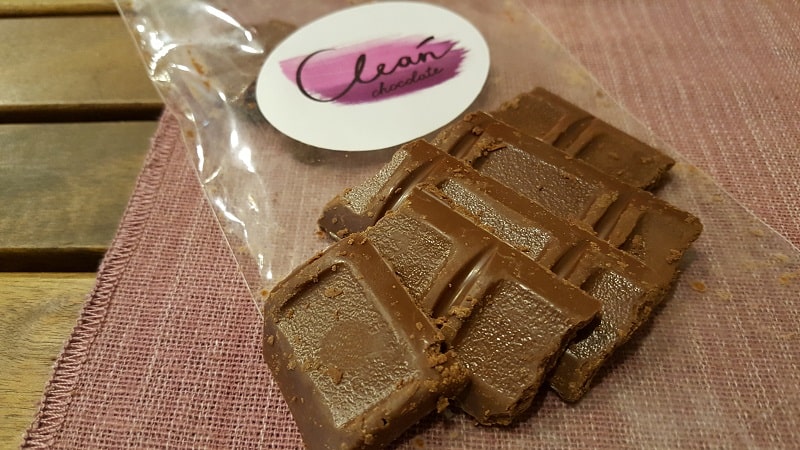
Jump To
What Makes Chocolates Keto or Not?
As with other keto foods, most brands define a keto chocolate as one which contains fewer than 1g net carbs per serving (regardless of serving size). This generally translates to a chocolate bar sweetened with calorie-free sugar alcohols (like powdered erythritol), and still made at a relatively high cacao percentage.
Keto is inherently a low carb diet, so most keto adherents eat fewer than 50g net carbs per day, with stricter adherents staying under 20g a day. But beyond the keto aspect, what is chocolate?
Chocolate is a product made with the fermented & roasted seeds of the tropical cacao tree, and usually sweetened by sugar and smoothed out by milk and a bevy of additives. In my house we only invest in the most delicious ethical chocolates we can find, but most of those contain waaaaay more than 1g net carbs per serving.
They're dynamic and unusual chocolates, and the addition of a sweetener really makes their flavors pop. But alas, many people end up disliking products marketed specifically as "keto chocolates," because they're unknowingly buying high percentage chocolates made with cheap, low quality cacao (that tastes flat & often bitter).
Chocolate can and should have floral and fruity flavors, even earthen notes of mushroom and the bite of a lemon. When you buy mass-market chocolates, even keto chocolate bars, you're almost always going to lose that complexity on the palate.

Keto Sweeteners
Then again, if you're just looking to indulge, you may just want the chocolatiest low carb chocolate bars you can get your hands on. While I've gotten into the idea of sugar free chocolate before, I hadn't yet dug into the pros/cons of various sweeteners, at least, as a person who enjoys food.
So let's look at the keto options for chocolate, all of which must be solid sweeteners: erythritol, xylitol, allulose, inulin, stevia, and monk fruit. Those first two are bulkier sugar alcohols, while the latter two are super-sweeteners extracted from a leaf and a fruit, respectively.
The middle two are more interesting in that they're plant-derived ingredients which taste sweet but don't impact blood sugar. Both sweeteners contain roughly a third the calories of sugar.
Erythritol, xylitol, and inulin are equal to or less than the sweetness of sugar, but all cause digestive upset if consumed in large quantities. Stevia and monk fruit are both 100-300x sweeter than table sugar, but have to be used in miniscule proportions, otherwise they start to taste chemical and artificial.
Most ketogenic chocolate brands use a proprietary blend of sugar alcohols and stevia or monk fruit, but some opt for only sugar alcohols. To produce keto chocolate, most makers proceed just as they normally would, only replacing the keto sweetener with the typical sugar.
The issue comes up mainly when a maker uses a sweetener that's not a 1-to-1 replacement for table sugar, like pure monk fruit extract. This is where supply & demand comes in, as chocolates like that tend not to have a balanced enough flavor and even a chemically aftertaste, turning off consumers before they can turn a profit.

Best Keto Chocolate Brands
There was a time not too long ago when any & all sugar-free products were sweetened with maltitol, which is not only less sweet than sugar, but it also tastes funny and causes intense digestive upset if you eat, say, a whole chocolate bar in one sitting.
There was no winning back then. But while there's no such thing as a carb-free chocolate, you'd be amazed how much difference just 15% sugar can add. With a full half a chocolate bar (1oz./~28g), that's still just 4 net carbs per serving!
So is dark chocolate keto? The answer is not always, but there are now a ton of low sugar dark chocolates out there, and even some keto chocolate options that have zero net carbs.
Looking in both online and physical shops, there are about a dozen-and-a-half keto chocolate brands, though six of them really stand out: Lily's (now owned by Hershey's), ChocZero, Keto Krack'd, CHOCXO, and ChocoPerfection.
Each of these has good distribution and people generally seem to enjoy their flavor. After all, with keto chocolate the most important consideration is the net carbs, and then the flavor— but most companies seem to forget the latter.
Personally, I tend to stay away from chocolates made with anything other than taste in mind, from the bars trying to save wildlife to those trying to up your daily fat intake. In those cases, manatees and macros tend to take precedence over the ethical sourcing of cacao & the final flavor of the product.
But if you're in a jam and only have one of these on hand, here's the down low on the best keto chocolates.
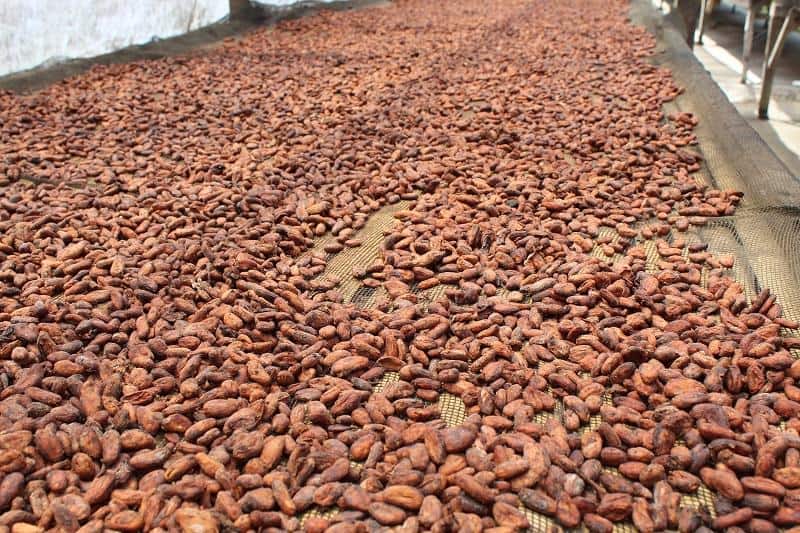
CHOCXO
Founded 2014
Previously a chocolate shop in California, a few years back the couple behind CHOCXO moved up to Vancouver, Canada to expand the brand. Originally it was a standard bean to bar chocolate company.
However eventually they settled upon a niche in keto-friendly foods made with real sugar & high quality cacao— just a bit less of the former. The line is sweetened with cane sugar, and it includes chocolate squares, almond butter cups, and chocolate-covered nuts.
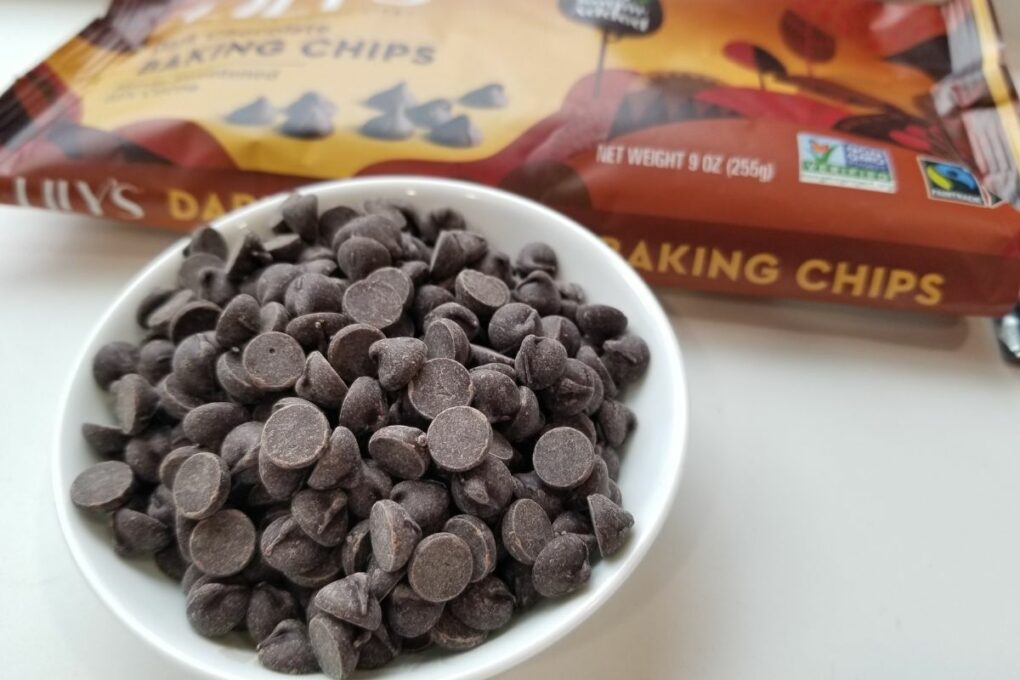
Lily's Sweets
Founded 2010
Unfortunately, as of mid-2021, Lily's is owned by Hershey's. Lily's chocolate line was initially released after the co-founder, Cynthia, finally felt she'd perfected her maltitol-free, sugar free chocolate. The homemade confection actually came about due to her own lifelong struggle with her weight.
I've been enjoying adding them to baked goods like my chocolate chip rice krispie treats.
Over the years it's become a popular keto chocolate option due to their low-carb inclusions. The line is sweetened with an erythritol, inulin, and stevia blend, and it includes chocolate bars, baking chips, and treats like chocolate peanut butter cups.
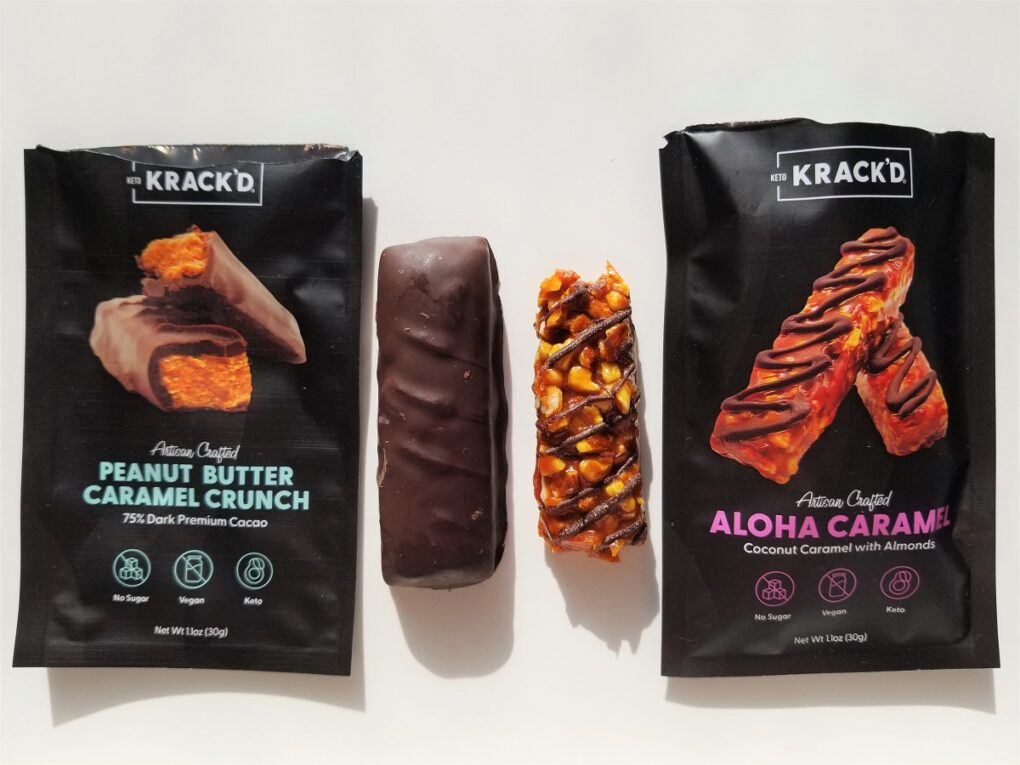
Keto Krack'd
Founded 2020
One of many sugar-free chocolate brands that have found their footing during the pandemic, Keto Krack'd is a new favorite of mine. The chocolate sweetened with allulose and monk fruit has absolutely no weird aftertaste or cooling sensation on the tongue, like most of the keto chocolate brands out there.
I was sent both the peanut butter crunch bar and the aloha caramel for private feedback, but decided to add them to this guide because the products are genuinely fantastic. My only qualm is that the peanut butter toffee is too dense to just bite into, and they only have a few different products at the moment.
We want more, and hopefully soon they'll be able to satisfy their increased demand. You can also use code DAMECACAO for 15% off your first order, if you want to try these bars for yourself!
The line is sweetened with an allulose and monk fruit blend, and is fully dairy-free, gluten-free, and sugar-free. Right now it includes a variety of chocolate peanut butter toffees, coconut milk caramels, and seasonal truffles (though their white chocolate is sweetened with erythritol).
ChocZero
Founded 2017
ChocZero is one of the newer keto chocolate companies, having been launched just 6 years ago in direct response to the popularity of the keto diet. They have a particularly diverse product range and have expanded quite quickly, likely in part thanks to going so hard with influencer partnerships.
Their milk chocolate in particular is a fan favorite. The line is sweetened with a corn fiber and monkfruit sweetener blend, and it includes peanut butter cups, chocolate bark & bars, baking chips, and a few different syrups & spreads.
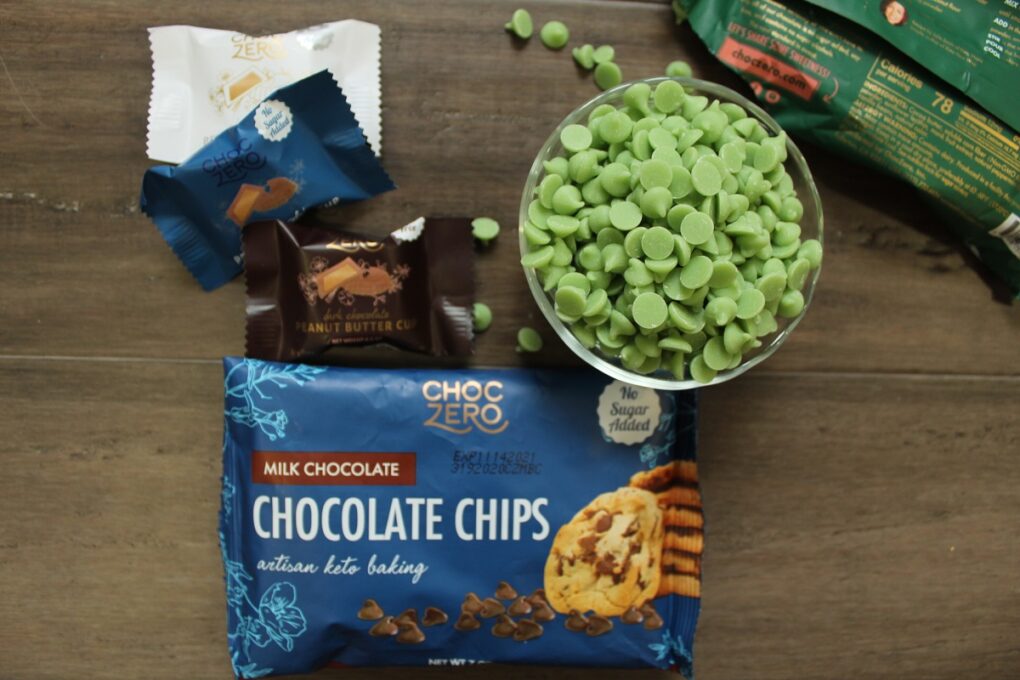
ChocoPerfection
Founded 2003
ChocoPerfection is the oldest brand on this list and the packaging design reflects that. But these bars are also unique relative to these other brands in that it's sweetened with a fiber rather than a sugar alcohol.
Therefore it also contains fair amounts of fiber along with the fat. The line is sweetened with a blend of erythritol, and chicory root fiber/FOS, and it includes chocolate bars in several flavors.
It's easy to see all these keto chocolate brands popping up online, but chocolate is a very complicated substance, and much easier to mess up than get right. Consider buying from the several small companies which also make delicious, unusual keto craft chocolates, including Raphio, Amedei, Zotter, and The Good Chocolate.
The latter of those keto chocolate brands is a craft chocolate company dedicated to producing sugar-free fine chocolates. Some of those small companies even make keto chocolate chips, somewhat of a rarity these days!
In a simple google search I found many more keto friendly chocolates than I could list here, so I've just stuck to the basics. Lindt, Ghirardelli, Hu's, and even Green & Black's have high percentage darks that could function as keto dark chocolates, but those companies have questionable transparency, so this is me not endorsing them.

Homemade Keto Chocolate (Recipe)
In my personal life I've been messing around a lot with hot chocolate bombs, and I've seen a lot of parallels with keto chocolate fat bombs. The difference here is that the fat bombs will be equally tasty eaten straight as if they were dropped in a glass of almond milk!
But part of the trick with that is just buying high quality chocolate, and I don't mean Lindt or Godiva but craft chocolate made with carefully-sourced cacao.
Then the rest of the trick is to add a small amount of extra cocoa butter to lessen the impact of the bitterness of the dark chocolate, in a way that adding coconut oil does differently. There are a few other special additions, but I'll get to those in a moment. First, gather your ingredients!
- 100g/3.5oz. 100% dark chocolate (also called baking chocolate, cacao liquor, unsweetened chocolate, or cacao mass)
- 25g/1oz. organic food-grade cacao butter (extra coconut oil is okay, too, but cacao butter is better)
- 25g/1oz. organic food-grade coconut oil
- ⅛t. pure monk fruit extract
- ⅛t. sea salt
- ⅛t. vanilla powder (or ¼t. liquid vanilla extract)
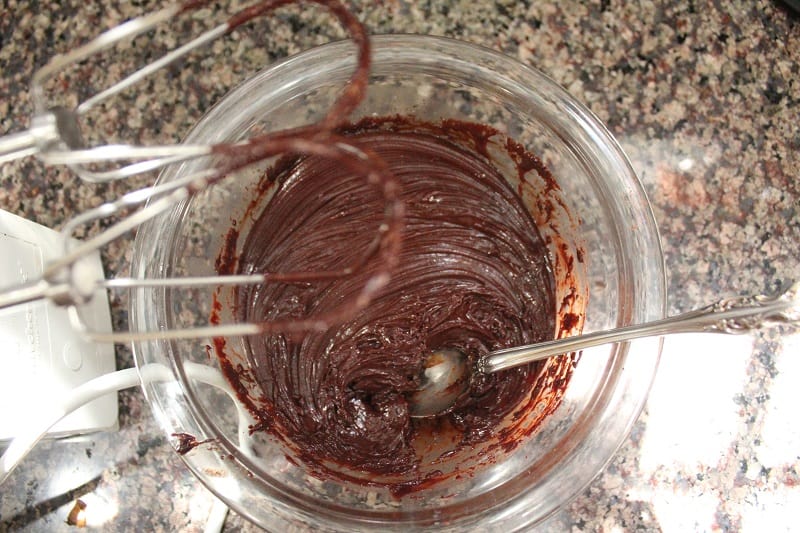
If you have a double boiler, add the dark chocolate, cocoa butter, and coconut oil to the top and melt over low heat until all 3 are totally melted. If you don't have a double boiler, then you can use the microwave method: nuke the cocoa butter & coconut oil for 45 seconds on 100% power.
Chop your chocolate into smaller pieces, then add it to the melted oils and heat it all on 20% power for 2 minutes. The final mass should be glossy and chunk-free, but if it's not, then heat on high for 10 seconds at a time, stirring the melted chocolate between sessions until it is.
Once the mixture is fully combined, add in your monk fruit, salt, and vanilla, and blend with a hand mixture for two full minutes, until almost whipped. Taste the mixture to see if it's sweet enough, and if not, add a teeeeeny pinch more of monk fruit.
Pour the mixture into your silicone chocolate mold and let it set for at least two hours in the fridge before de-molding them for storage. Many keto chocolate recipes use cocoa powder, coconut oil, powdered erythritol, and/or what's called "baking chocolate."
This is basically an unsweetened cacao mass, produced by grinding down roasted & peeled cacao beans, and which goes by many names depending on the country. The difference with my recipe is that the base of it is the 100% chocolate rather than cocoa powder.
The crux of it is the trace minerals and fiber provided by cacao, which will ease the digestion of all that fat. All of the antioxidants which make high quality chocolate such a superfood are actually protected by its naturally high fat content, so it's better for your body to use chocolate as a base rather than cocoa powder (defatted chocolate).
You'll also find that with the additional cocoa butter, the more bitter and tannic flavors of the cacao mass are less sharp, making for a more enjoyable eating experience.
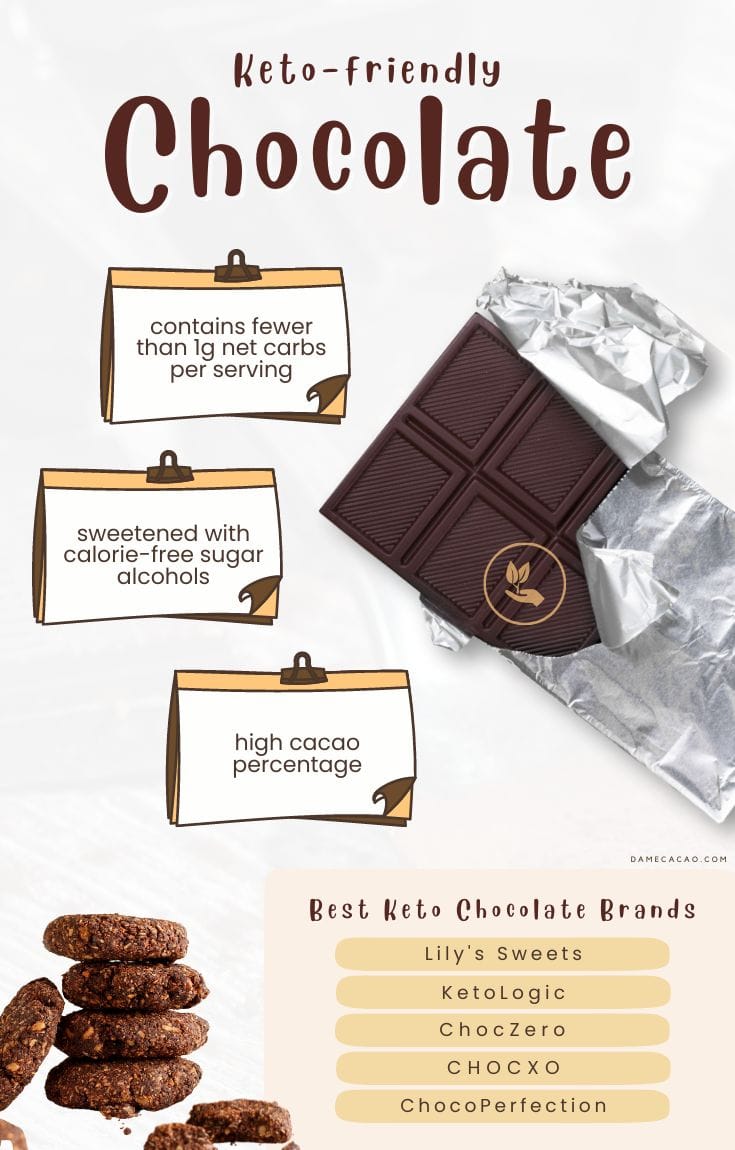
Keto Chocolate FAQ
I've shared some brand recommendations above, but if you're shopping in a basic grocery store, first consider how much of that chocolate you'll eat per day. If you plan to eat half a 100g bar, look for chocolates with 90% cacao content or higher (5g net carbs for the half bar), but if you want to eat that whole 100g bar, I'd just go for 100% cacao. Be warned, though, unless you're buying a craft chocolate, you'll probably find it quite astringent and bitter.
This depends on how many calories you're eating otherwise, but a keto-approved chocolate can be good for you. That is, as long as you're eating a high quality chocolate made with clean, mold free cacao, purchased at a fair price (I swear you can taste the ethics). That's because cacao, the base material for chocolate, is actually high in essential nutrients like magnesium and zinc, both of which are necessary for thousands of processes in our bodies. That said, I'd stick to less than 100g/3.5oz. of chocolate a day (equivalent of ~2 commercial candy bars).
You can find it most places, these days! Everyone from Amazon and Thrive Market to your local craft chocolate maker has some kind of keto friendly chocolate. Then you can use it to make your favorite keto dessert, like a chocolate cake, ice cream, and even a chocolate mousse!
The term "dirty keto" describes a ketogenic diet in which the adherent eats any & all foods which have 1g net carbs per serving or fewer, even if that means they only eat guacamole, bacon, and chocolate all day. I would not recommend this approach, but some keto experts say that doing a "dirty keto" cheat day could be a good way to keep adherents on the recommended 8-to-10-week initial ketogenic state. But whatever your approach, as long as the keto chocolate doesn't give you a stomachache, I say have as much as you like, because whether you believe me or not, you'll eventually get tired of it.
It seems like an obvious 'yes,' but actually, the answer is 'not necessarily.' Sugar substitutes can get quite complicated, and some of them may not be sugar exactly, but they still raise your blood sugar or are consumed like sugars in the gut. It's best to stay away from the unpronounceable options and stick to those which have been proven to keep you in ketosis (see below).
Erythritol, xylitol, inulin, stevia, pure monk fruit, and some people say that allulose is fine.

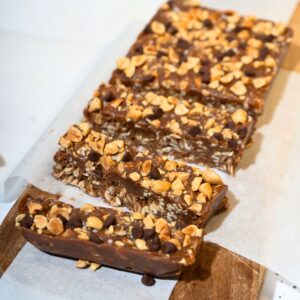
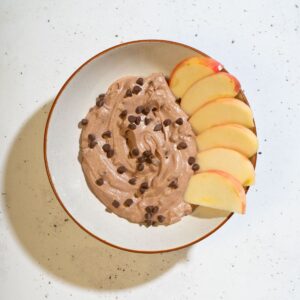


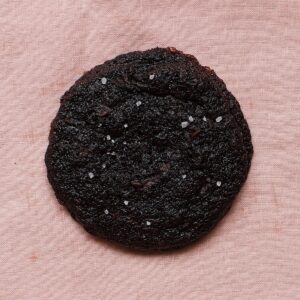





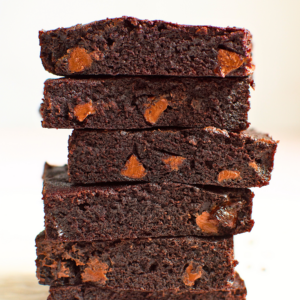





Comments
No Comments